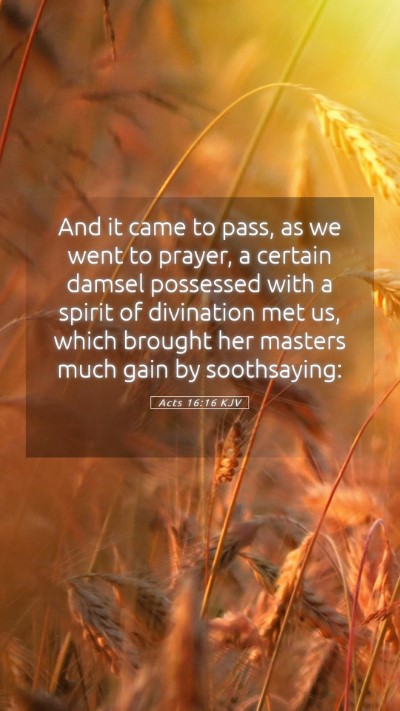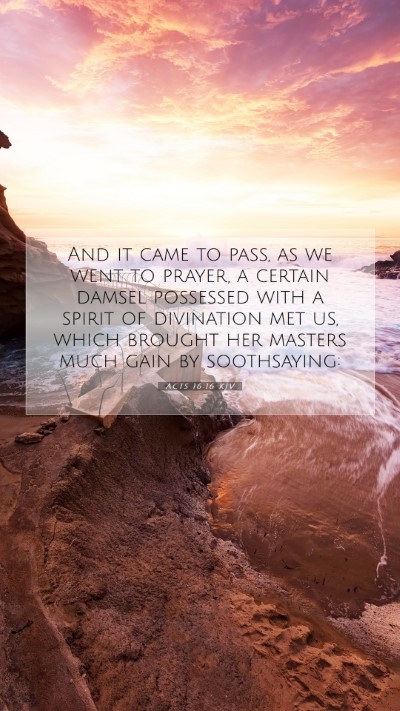Understanding Acts 16:16 - Biblical Exegesis and Insights
Acts 16:16: "And it came to pass, as we went to prayer, a certain damsel possessed with a spirit of divination met us, which brought her masters much gain by soothsaying."
The verse invites readers into a narrative filled with spiritual significance. It begins to reveal the profound implications of the interaction between Paul and a spirit-possessed young woman in Philippi. Below is a detailed examination through various commentaries.
Overview of Bible Verse Meaning
This account from Acts is rich with meaning and application. It highlights the contrast between true spiritual power and the falsehoods fueled by divination. The damsel symbolizes those who are ensnared by deceptive spiritual forces, whilst Paul represents divine truth and power to liberate. Here we explore key points derived from noted biblical commentaries.
Commentary Insights
-
Matthew Henry:
Matthew Henry notes that the encounter details an enslaved young girl who served as an oracle. Her ability to predict future events highlights the deception of her masters who profited from her condition. Henry emphasizes that while supernatural occurrences do happen, not everything labeled as spiritual is of God. This observation leads to a cautionary understanding of engaging with the supernatural.
-
Albert Barnes:
Albert Barnes draws attention to the girl's bondage, both to her masters and the spirit within her. He reflects on the economic backdrop of this passage, emphasizing that those who commodify spiritual gifts often exploit the vulnerable. Barnes suggests that this serves as a critique of society's values and economic malpractices that prioritize profit over humanity.
-
Adam Clarke:
Adam Clarke provides historical and cultural context, recognizing Philippi as a city involved in pagan practices and idol worship. He points out that the young woman’s ability to predict the future was not merely a curiosity but a common practice in the wider Greco-Roman world. Clarke encourages readers to perceive the spiritual warfare evident in this narrative, as it sets the stage for Paul's eventual exorcism of the spirit.
Key Themes and Applications
-
The Nature of Spiritual Warfare:
This narrative illustrates the ongoing battle between good and evil. Understanding Acts 16:16 invites deeper reflection on how believers today engage with spiritual forces. Believers are called to discern between divine and deceptive influences in their lives.
-
The Role of Divine Authority:
Paul's actions demonstrate the authority that believers have over oppressive spirits. This serves as a powerful reminder of the strength found in faith and the command to stand firm against spiritual darkness.
-
Exploitation and Social Justice:
Highlighting the exploitation of the girl, this passage raises awareness of social injustices within communities. This understanding provides a framework for discussions within Bible study groups regarding advocacy and the calling to protect the marginalized.
Cross-References
- Luke 4:18: The Spirit of the Lord is upon Jesus, indicating His mission to set the oppressed free.
- Acts 19:16: Another account of demon possession reinforces the power dynamics present in spiritual encounters.
- 1 John 4:1: This verse encourages believers to test the spirits to see whether they are from God.
Conclusion
The exploration of Acts 16:16 through these commentaries reveals rich layers of meaning and insight about human struggle, divine intervention, and the ethical implications of spirituality in society. By examining this verse, individuals can gain a deeper understanding that transcends the text and invites profound reflection on personal faith and community responsibility. Through scripture analysis, believers can engage with these themes in Bible study groups or personal reflection, enriching their journey through the biblical text.
Further Study Resources
Consider utilizing the following tools for deeper insights:
- Bible study lessons and guides focused on spiritual authority.
- Online Bible study platforms featuring commentaries like those of Henry, Barnes, and Clarke.
- Bible study materials aimed at social justice implications in Scripture.


